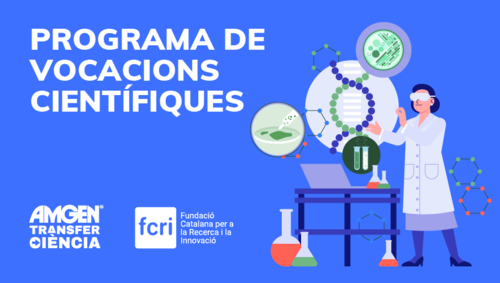Three IRBLleida researchers participate in the 'Amgen TransferCiència' educational programme for the promotion of scientific vocations
It is an initiative of the biotech company Amgen and the Catalan Foundation for Research and Innovation
The educational programme to promote learning and scientific vocations in biotechnology and genetics Amgen TransferCiència begins its fifth edition in Catalonia this month (academic year 2023-2024). A total of 15 young researchers, including three from the Institute for Research in Biomedicine of Lleida (IRBLleida) and the University of Lleida, will conduct master classes and practical workshops for 364 students in 4th ESO and 1st and 2nd Baccalaureate from 15 schools from all over the territory. The programme, organised by the biotech company Amgen and the Catalan Foundation for Research and Innovation (FCRI), aims to improve science learning, with a special focus on biotechnology and genetics.
This year, the initiative has expanded its coverage nationwide, reaching a total of 31 locations in Catalonia, Madrid, Valencia, the Balearic Islands and Galicia. The Amgen TransferCiència scientific team is made up of 34 researchers (32% postdoctoral researchers, 65% predoctoral researchers and 3% senior researchers), 76% of whom are women, who will collaborate with 35 schools.
In this edition, 18 new localities have been added. In Catalonia, these are Tàrrega and Balaguer (Lleida); Sant Feliu de Guíxols, Olot and Ripoll (Girona); Igualada, Vallbona d'Anoia and Santa Perpètua de Mogoda (Barcelona); as well as El Vendrell and l'Ametlla de Mar (Tarragona). These are in addition to the centres already participating in previous editions, located in Lleida, Barcelona, Vic (Barcelona), Sant Gregori (Girona) and Tarragona.
The programme trains researchers to provide students with learning situations that connect with real-life contexts, as envisaged in the current curriculum (Decree 175/2022), with the aim of fostering vocations in biotechnology and genetics. The young scientists propose scenarios that connect different blocks of the curriculum, such as the cell, health and disease, immunology and genetics and evolution in ESO; and knowledge of genetics, immunology, biotechnology and evolution in baccalaureate, with their fields of research. In this way, students not only broaden and consolidate their knowledge in the fields of genetics and biotechnology, but the programme also gives them a real insight into science and the figure of the researcher.

For the first time, the initiative reaches Tàrrega and Balaguer






